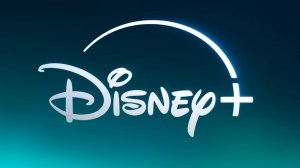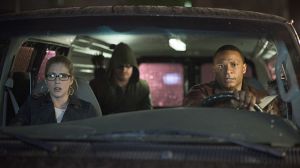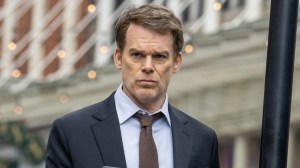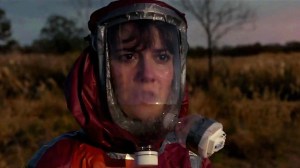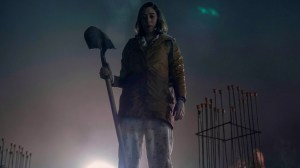Star Wars: The Clone Wars is currently airing new episodes on Disney+, capping off a years-long campaign for fans to see the series return. The seventh and final season has already given fans a evolved and emotional take on the iconic series, with the help of a slew of returning faces. One person who has been an instrumental part of Clone Wars – as well as a significant amount of Star Wars television – has been Kevin Kiner, who serves as the series composer. Kiner, whose filmography also includes Stuart Little, Leprechaun, Titans, and Star Trek: Enterprise, first joined Clone Wars in 2008, and has been a part of the franchise ever since. Once Clone Wars initially came to a close in 2013, Kiner went on to compose the music for Star Wars Rebels, and he has been happy to return back to where it all began with Clone Wars.
Videos by ComicBook.com
In celebration of the series’ Disney+ return, we got a chance to chat with Kiner about how the music of Clone Wars has grown in the seventh season. In the process, we spoke about how composing for Clone Wars has become a family affair, how the fandom has evolved, and what advice he would give aspiring composers.

Origin Story
ComicBook.com: How did you initially get started in the Star Wars universe?
Kevin Kiner: Well, I think George Lucas was a fan of the music I did for CSI Miami. I scored that show for 10 years, but I’d also done a bunch of big sci-fi projects. I did a movie called Wing Commander with, funnily enough, Freddie Prinze Jr. who I’d go on to work with at Rebels. He was the voice of Kanan, and I got to hang with Freddie a bunch when we did Rebels. And I had done Stargate SG-1. So I think I had a combination of sci-fi, space music. And I’d done Superboy, which was also in the John Williams style, a long time ago.
But I think George also wanted the music to move forward, and he wanted to try something different. So it was an audition process, and I was one of the guys to audition. And I think there were five of us, and they gave us a scene to score. And I was the one they chose, and the rest is history. I’m really honored to be that guy.
Returning to Clone Wars

How has it felt for you to jump from Rebels back into the world of Clone Wars?
Oh, it’s extremely gratifying. For one thing, to be able to finish a story that never really got finished, with Clone Wars. The other thing that was cool was that there had been five years that had gone by and a lot of things had changed. Technology had changed for the picture. I think season seven looks better than any of the other seasons. The stories are fantastic, and also music has changed a little bit too. And I really endeavored to take the music and the score for season seven and keep it really modern and fresh. I think we’re using some synthesizer and electronic elements that reflect that. Most of all, I’m just really happy that we got to tie up the series, and I think season seven is the best season of any of them.
What were your influences and goals for the music of this season?
Well, there’s a lot of emotional things that are going on. Ahsoka is dealing with having left the Jedi and she’s maturing and she’s dealing with that and the repercussions, yet she is still a strong force to be reckoned with. So there’s her journey, which is really cool.
I think Darth Maul is a big presence in season seven, so that’s a huge dark element. I’m really happy with the theme I wrote for Darth Maul. Actually, my eldest son Sean, co-wrote that with me and we’re really happy with that.
It’s a really mature journey and at the end of a lot of things, without giving away the story. Also, I think it wound up being what we all wanted Clone Wars to be. We had really lost the goal for Clone Wars, and I think we achieved a lot of those during the first six seasons. So being able to take a fresh stab at it after five years, I think, really really served the series well. I think it’s the best, and what we all wanted the show to be from the beginning.
Collaboration
What would you say you’re most proud of, with regards to the music for this new season?
I think I’m really proud of keeping it fresh. I’ve written probably over a hundred hours of Star Wars music over the last 13 years or so As human nature, it’s hard for anyone to stay with a particular job for that long and get excited about it every morning. Having said that, I don’t think there’s any job that it’s easier to get excited about than waking up in the morning and writing music for Star Wars. That’s pretty great. And I constantly remind myself of that.
I’m also really proud that my sons are involved now because they bring a fresh perspective. They’re younger, obviously, than me, and so the music they grew up with is different than the music I grew up with. They really push me and keep me current, and also their compositions are really interesting. So, not all of the burden is falling on me to write 22 minutes every week, or every couple of weeks, of Star Wars music. I think that’s really wound up being a really positive influence in the show.
Iconic Themes

You’ve spoken in previous interviews about incorporating John Williams’ themes into the tapestry of Clone Wars. I was wondering if you could speak about that process a little bit more, especially with regards to this season, because I find that really fascinating. It feels like depending on how you could go with it, it would almost come across as a little too self-aware or a little too excessive, but I think you’ve created a really interesting balance with it.
Well, thank you. I think the fans are aware of how much I revere John Williams and his music, and it was always my intention to put the best foot forward with that music. One of the things that you run up against in doing a lot of music for Star Wars is that you could overuse those themes. The Force theme, or “The Imperial March”, or whatever it is. So we use John Williams’ themes really sparingly and they’re reserved for the moments that are incredibly important.
Even we use Ahsoka’s theme [sparingly], which I composed. But I find that the Ahsoka theme has really become a big part of the Star Wars universe. And we have to treat that so we don’t overuse it whenever we see her on-screen. So we only play her theme at certain times when it’s really an important moment.
I think that’s how you keep it fresh, and that’s how you keep it from overusing something. It’s like overusing sugar or something. I mean sugar’s fantastic, but you can’t just pour pure sugar down your throat… although some people do, I guess. But it’s way better when it’s in moderation. Then all of a sudden, you have something sweet, and it’s fantastic.
Fandom
How has it felt to be part of the Star Wars universe, particularly as the storytelling and scale have expanded in the past decade or so?
Well, it’s an incredible privilege to be part of that. And sometimes when you do something for so long, you can lose sight of how special it is. Star Wars is so big that it’s pretty hard to lose sight of how special it is. One of the things I really like is doing interviews like this, because you remind me of what a great gig I’ve got, and also of the history. I’ve been doing this for 13 years, and it’s really nice to look back at that journey, and the fact that the fans are really happy and digging the music I’ve done. I mean it’s gratifying beyond words really. I guess I’m better with music than I am with words. I don’t know what else to say.
I totally get what you mean. Even as a fan, I went to Star Wars Celebration for the first time last year, and being able to feel the genuine love and the generational aspect was really surreal. So I can imagine how surreal and crazy it is on your end, from the creative aspect of it.
I just did a podcast yesterday, and one of the guys said he was bringing up the Clones theme. He’s extremely into the music, and not all the people are aware of what the Clone theme is. And it was just so wonderful, for a guy I’ve never met to be able to talk to me about something that I wrote that’s touched him. He was going through a tough time in his life, and Clone Wars really was a positive influence in his life. It’s like, “Wow, that’s way better than making missiles for a living or something like that.” I’m really glad I was able to touch people in a positive way.
That ties perfectly into my next question, which is what has surprised you the most about composing in the Star Wars universe?
What has surprised me? Well, I think the fans’ reactions. I guess we’re all a bit insecure or something. I just can’t believe that everybody is such a fan of stuff I’ve written. I guess I believe it now. It’s really gratifying. I’m really proud to be a composer that has touched people and written melodies that they remember. That’s a great gift, and I treat it with respect always.
Tenacity

If you had advice for anyone who is looking to break into your industry, what would it be?
I’ve watched a lot of documentaries and a lot of interviews with musicians over the years. And I think the one thing that I always hear people say, who are more successful, is to be tenacious. It has to do with tenacity and sticking to it. Dan Rather has this great quote that is “Luck is where opportunity meets preparation.” And if you are prepared and if you’ve done your homework and you’ve practiced and you’ve lived and breathed your craft, then the opportunity will come. It’s a matter of when and where and you just have to really, really be tenacious and it has to be the most important thing in your life. It just has to be the one thing that you will not quit until you get that break.
Your filmography covers so many different aspects of the entertainment industry, including Star Wars, but is there a project you haven’t done yet that is still your dream project?
I’d really love to do a Star Wars live-action movie. Probably every other film composer would answer that way too. It’s like an actor saying, “Yeah, I’d really love to do The Godfather” or something like that. I don’t know. I mean, that’s definitely on my bucket list to do the feature.
***
New episodes of Star Wars: The Clone Wars premiere Fridays exclusively on Disney+.



